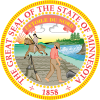| Baker v. Nelson | |
|---|---|
 | |
| Court | Minnesota Supreme Court |
| Full case name | Richard John Baker et al., Appellants, v. Gerald Nelson, Clerk of District Court, Fourth Judicial District, in Hennepin County, Respondent |
| Decided | October 15, 1971 |
| Citation | 291 Minn. 310, 191 N.W.2d 185 (1971) |
| Case history | |
| Prior action | Plaintiff's claim dismissed |
| Appealed from | Hennepin County |
| Holding | |
| OPINION:[1] Denial of the statutory entitlement demanded by gay citizens to marry the adult of one's choice "does not offend the . . . United States Constitution". | |
| Court membership | |
| Chief judge | Oscar Knutson |
| Case opinions | |
| Decision by | C. Donald Peterson |
| Majority | unanimous |
| Concurrence | Martin A. Nelson, William P. Murphy, James C. Otis, Walter F. Rogosheske, Fallon Kelly |
| Laws applied | |
| Minn.St. c. 517; U.S. Const. amends I, VIII, IX and XIV | |
Overruled by | |
| Obergefell v. Hodges (2015) | |
Richard John Baker v. Gerald R. Nelson, 291 Minn. 310, 191 N.W.2d 185 (1971), was a case in which the Minnesota Supreme Court decided that construing a marriage statute to restrict marriage licenses to persons of the opposite sex "does not offend" the U.S. Constitution.[2] Baker appealed the decision, and on October 10, 1972, the U.S. Supreme Court dismissed the appeal "for want of a substantial federal question".[3]
Because the case came to the Supreme Court through mandatory appellate review (not certiorari), the dismissal constituted a decision on the merits and established Baker v. Nelson as precedent,[4] although the extent of its precedential effect had been subject to debate.[5] In May 2013, Minnesota legalized same-sex marriage and it took effect on August 1, 2013.[6] On June 26, 2015, the Supreme Court explicitly overruled Baker in Obergefell v. Hodges, making same-sex marriage legal nationwide.[7]
- ^ Title of decision, as posted by the court.
- ^ "Baker v. Nelson, 291 Minn. 310, 191 N.W.2d 185 (Minn. 1971)". casetext.com.
- ^ 409 U.S. 810 (1972): Hennepin County had argued that the marriage license issued previously in Blue Earth County suggested that the "Questions Raised by This Appeal Are Moot."
- George M. Scott, Hennepin County Attorney, "Appellee's Motion to Dismiss Appeal and Brief" in the Supreme Court of the United States, October Term, 1972, page 7.
- See: McConnell Files, "America's First Gay Marriage" [binder #3, file #6], Tretter Collection in GLBT Studies, University of Minnesota Libraries.
- ^ Cite error: The named reference
Winnickwas invoked but never defined (see the help page). - ^ Coyle, Marcia (August 23, 2010). "The first case, 40 years on". The National Law Journal.
- ^ Davey, Monica (May 14, 2013). "Minnesota: Governor Signs Same-Sex Marriage Into Law". New York Times. Retrieved June 30, 2015.
- ^ Obergefell v. Hodges, No. 14-556, 576 U.S. 644 (2015).
